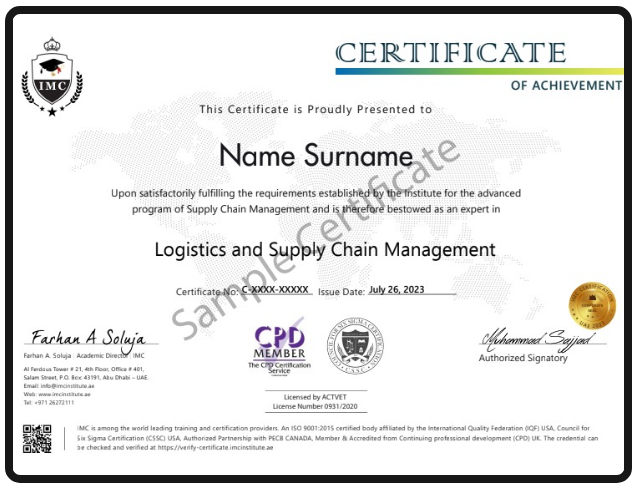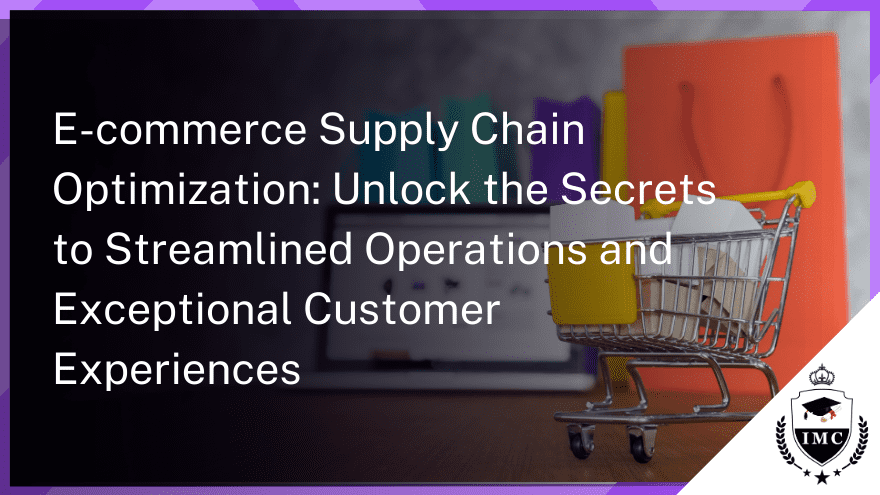The e-commerce industry has experienced an unprecedented surge in recent years, revolutionizing the way businesses operate and consumers shop. With the convenience and accessibility offered by online platforms, more and more consumers are embracing the world of e-commerce, driving a massive shift in retail dynamics. This seismic change has posed significant challenges for businesses as they strive to optimize their supply chain operations to meet the evolving demands of the online marketplace.
In this rapidly evolving landscape, supply chain management has become a critical component of e-commerce success. Effective supply chain strategies are essential for ensuring timely order fulfillment, maintaining inventory accuracy, and delivering exceptional customer experiences. However, the complexities of the e-commerce supply chain, coupled with the need for agility and responsiveness, can overwhelm even the most seasoned professionals.
At IMC Institute, a leading educational institution in the UAE, we recognize the pressing need for skilled professionals equipped with the knowledge and tools to tackle the intricacies of e-commerce supply chain management. Our comprehensive Supply Chain Management Certification program is designed to empower individuals with the necessary expertise to navigate this dynamic field, enabling them to drive operational excellence and achieve sustainable growth in the online retail arena.
Understanding the E-commerce Supply Chain
An e-commerce supply chain encompasses all the logistics involved in getting your products from the supplier to your customer's doorstep. This includes:
Sourcing and procurement: Establishing strong relationships with reliable suppliers who can meet your demand fluctuations.
Warehousing and inventory management: Implementing efficient storage solutions and accurate inventory tracking systems.
Order fulfillment: Streamlining the picking, packing, and shipping processes to ensure fast order turnaround times.
Delivery and returns management: Partnering with reliable carriers and offering smooth returns experiences.
Optimizing Your E-commerce Supply Chain for Success
Here are some key strategies to optimize your e-commerce supply chain:
Embrace technology: Invest in warehouse management systems (WMS), order management systems (OMS), and data analytics tools to automate tasks, improve visibility, and make data-driven decisions. These technologies can significantly enhance efficiency and accuracy.
Prioritize agility: Be prepared for fluctuating demand. Utilize forecasting tools and implement flexible fulfillment strategies to adapt to seasonal peaks and sudden surges in orders.
Strategize warehouse locations: Consider strategically placing warehouses closer to your customer base to reduce shipping times and costs. This can be particularly beneficial for high-demand products.
Offer multiple fulfillment options: Cater to diverse customer needs by providing a variety of shipping options, including standard, expedited, and same-day delivery where feasible.
Focus on transparency: Provide real-time order tracking information to keep customers informed about the status of their purchases. This builds trust and reduces customer inquiries.
Optimize last-mile delivery: Partner with reliable carriers who offer competitive rates and efficient delivery networks. Consider exploring same-day delivery options in high-density areas to elevate your customer experience.
Streamline returns: Make the return process hassle-free for customers. Offer clear return policies, provide prepaid return labels, and process returns promptly to maintain customer satisfaction.
Strategies for Supply Chain Optimization
To thrive in the e-commerce landscape, businesses must adopt proactive strategies to optimize their supply chains. Here are some key tactics to consider:
Embrace Technology: Invest in advanced supply chain management software and analytics tools to track inventory levels, monitor demand patterns, and optimize logistical operations.
Enhance Collaboration: Foster strong partnerships with suppliers, manufacturers, logistics providers, and other stakeholders to streamline communication, reduce lead times, and improve overall efficiency.
Implement Just-in-Time (JIT) Inventory: Adopt a JIT inventory system to minimize excess inventory holding costs while ensuring products are available when needed, thus reducing the risk of stockouts.
Leverage Data Analytics: Harness the power of data analytics to gain insights into consumer behavior, market trends, and supply chain performance, enabling informed decision-making and agile responsiveness to changing market dynamics.
Optimize Last-Mile Delivery: Explore innovative solutions such as drone delivery, crowdsourced delivery, or partnering with third-party logistics providers to optimize last-mile delivery and enhance customer satisfaction.
Prioritize Sustainability: Incorporate sustainable practices into your supply chain, such as eco-friendly packaging, energy-efficient transportation, and ethical sourcing, to meet the growing demand for environmentally conscious products and reduce your carbon footprint.
Certification:
On successful completion of the course and course requisites, the candidate will receive Internationally recognized Supply Chain Management Certification.

The IMC Advantage
At IMC Institute, our Supply Chain Management Certification: program equips you with the knowledge and skills to navigate the complexities of e-commerce supply chains. Our comprehensive curriculum covers topics such as inventory management, warehouse operations, transportation management, and risk mitigation strategies.
By enrolling in our program, you'll gain the expertise to:
- Design and implement efficient e-commerce fulfillment processes
- Leverage technology to optimize supply chain operations
- Build strong relationships with suppliers and partners
- Manage costs and improve profitability
- Enhance customer satisfaction through fast and reliable delivery
Summary
Throughout this insightful blog post, we delve into the challenges and opportunities that the e-commerce boom presents for supply chain management. We explore the complexities of the e-commerce supply chain, highlighting the critical need for agility, responsiveness, and seamless integration of various processes.
To thrive in this evolving landscape, businesses must embrace cutting-edge technologies and data-driven decision-making. Our Supply Chain Management Certification program equips participants with the knowledge and skills to leverage automation, robotics, real-time inventory management systems, data analytics, and predictive modeling. Additionally, we emphasize the importance of supply chain visibility, collaboration, and aligning efforts across the entire supply network.
As the e-commerce industry continues to grow, sustainability and ethical practices have become paramount considerations. Our curriculum addresses crucial aspects such as reverse logistics, waste management, sustainable sourcing, and carbon footprint reduction, ensuring that professionals are equipped to make responsible and environmentally conscious decisions. By completing IMC Institute's Supply Chain Management Certification program, professionals gain a comprehensive understanding of the e-commerce supply chain landscape, enabling them to navigate challenges effectively and drive success in the online retail arena. Enroll today and equip yourself with the essential skills to thrive in the dynamic world of e-commerce supply chain management.






